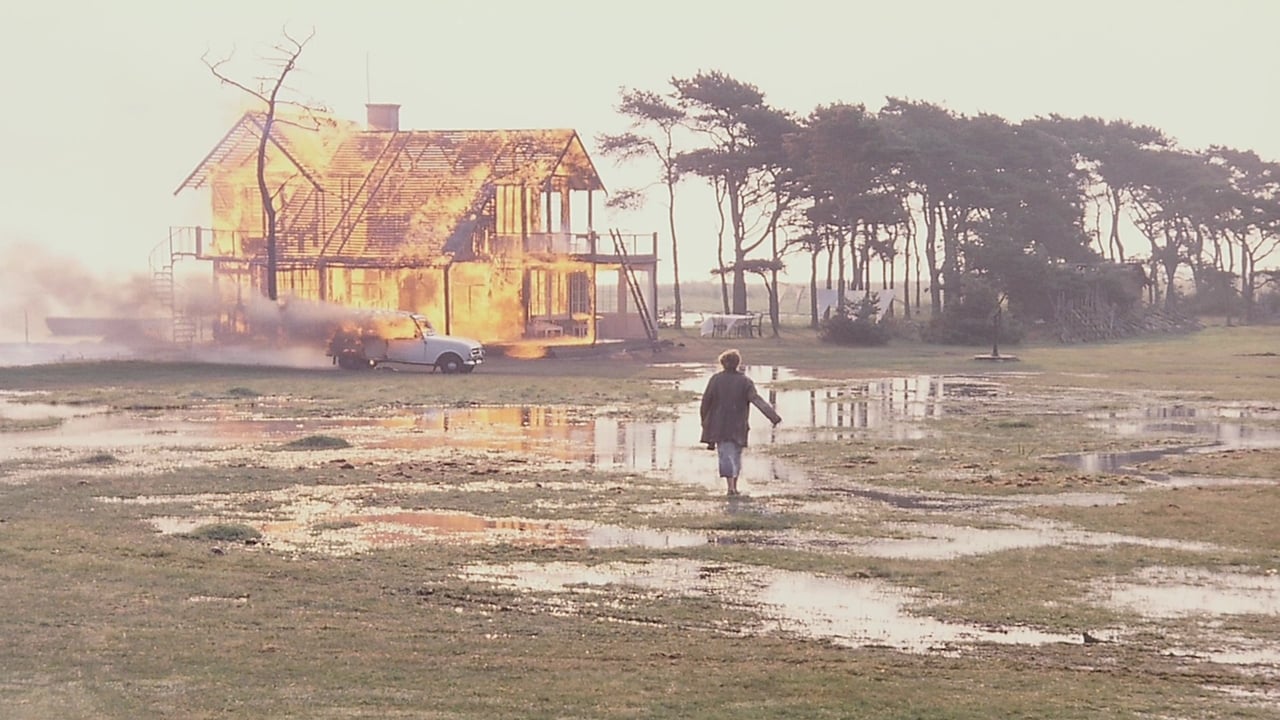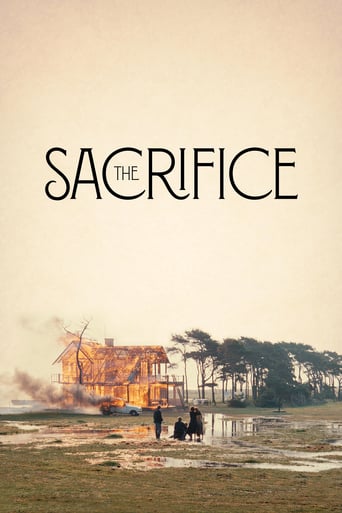

My 3rd Tarkovsky movie. Isn't the maestro's best, But is still a Masterpiece. As always, his long shots create their own cinematic language. Use of reflections in mirrors is remarkable. It's a Swedish movie ( Tarkovsky's second and final movie out of Russia) and often reminds one of a Bergman movie. Sven Nykvist( Cinematographer) coincidentally was a regular collaborator with Bergman. Bergman and Tarkovsky always shared mutual respect for each other's work. This movie probably was a bit of a tribute to Bergman from the latter. The ending is hauntingly beautiful. Watch it to witness the end of an era. The end of Tarkovsky, who merged art with movies, like no man ever did.
... View MoreThere is no film like The Sacrifice; it may be one of the greatest films...it is unique among films. Tarkovsky puts himself into a realm of his own. Filmed profoundly, and exquisitely; it is so pleasing to the eye; a director, at the height of his powers; pure patience, in the frames. There are many frames within frames here; *spoiler*; perhaps this represents the characters isolation? Existentialist Terror/Harmony awaits here. Wise. Profound.Truly, what is greater, than a film of this nature? A director, who creates philosophical examination, unlike any other; meditations, and streams of pure philosophical consciousness; true joy; refreshing; endearing. It is a joy for anyone, who is stimulated by deep, heavy, philosophical life thought. It muses on death, and existentialism. It muses on materialism, but not in particularly buying materialism, but materialism in how we treat the earth; the nature materialism, earth's materialism. It muses on machinery; verses nature; man verses nature. How we may decant ourselves to a high plain, but alas, return to earth, and destroy. How we destroy ourselves, destroy the earth. Disillusionment with life, all. It is truly chilling, and devastating. It is a philosophical piece of lecture; it can be examined many times over. How faith, in a case, can be pursed from self-destruction; loss of self; hopelessness; this is when faith is pursued; when our fears are eternalized, and hope is lost; spiritual belief is lost, that someone may seek out their faith; our primal fears. Tarkovsky is one of the directors closest to capturing philosophy on the screen. The switching between black & white, and color, immortalizes the scenes, and drives them into your subconscious; exquisite. It considers how truth, and knowledge, can lead to existential suffering; though which can lead to profound wisdom; do we find comfort in terror? It is a reflection of ourselves.Some sayings remind me of 'As A Man Thinketh'; a profound, beautiful, and special book. I imagine the actors became wise, from merely speaking their thoughts of the character; profound questions are asked, and it gives you questions, like good philosophy does. It is extraordinary and unique; the levitation scenes, and the one's that follow it...there is nothing like it in cinema; like a steam of memories; of terrifying but profound scenes...truly ethereal. The fire scene is.....something that is not of this world. There are filmmakers/directors, and then there is Tarkovsky; he is a pillar; a person, who, him himself, and his films, seem so unreal as to exist. This film......really makes you believe there is magic in the world; like seeing a Salvador Dalí painting for the first time. Something, which is like a portal, to another world; something that elevates you to a higher, magical, ethereal realm, and fills you with pure joy as to something like this could possibly exist.
... View MoreExiled from his native Russia, Andrei Tarkovsky shot his final film, The Sacrifice, on Faro Island, where Ingmar Bergman produced his body of work (and also lived). Tarkovsky also used Bergman's cinematographer, Sven Nykvist. He was also aware that this would be his ultimate film, as he had been diagnosed with terminal cancer. Unfortunately, whilst he survived till the release of the film, he died shortly afterwards, in the same year. The subject of his concluding piece is telling of his knowledge of his impending departure from the world, and it is fitting and profound, as you might expect from the Russian master of the poetic, and aesthetic.Alexander (played by Erland Josephson - a Bergman regular, who also worked on Tarkovsky's 1983 Nostalgia), has a birthday, where some family and close island friend, Otto (Allan Edwall), come to offer their congratulations. They here on a statically-interrupted television broadcast. that a nuclear strike is imminent. With this news the family break down emotionally, and Alexander pleads to God to alter this reality, and offers himself in sacrifice to the ones he loves. This offering is seen to its fundamental conclusion when he wakes (possibly from a dream), and all is as it was, the threat of World War III seemingly never a subject of genuine certainty. Towards the climax of this film, is a one-shot take lasting several minutes, whose logistics are incredible, but Tarkovsky still manages to infuse the scene with some kind of mystical power, that I believe permeates all of his films.As you would expect from a Tarkovsky film, the pace is slow (which gives the audience time to immerse themselves within the intricacies of philosophical thought, and the profound nature of the situation). But with this comes a flurry of beautiful imagery. The muted colours reflect the setting, with its cold, and subdued backdrop. And what is it that we do when we face death - a difficult moment to comprehend? We perhaps reflect on our achievements, and speak to our friends and family. And perhaps when we die, our spirit lives on in others, or new beings. Or maybe we simply continue in the minds and spirits of our offspring, passing on knowledge, character, and morality.www.the-wrath-of-blog.blogspot.com
... View MoreSergei Tarkovsky has an unique cinematic diction: fragmented, complicated, anachronistic, with lengthy shots taken from static positions, long soliloquy, static frames with close resemblance of theatrical stage than a movie. He reminded me of Ingmar Bergman time and again while watching his movie ' Sacrifice', his last directional flick. Perhaps because the locale was Sweden, and the theatrical setting was reminiscent of Autumn Sonata: similar guilt complex, confessional monologues, predominant gloomy shades in shot compositions. The cinematic language is pretty dense, with layered allusions, switching between real and imaginary sequences. The movie starts with the Leonardo Da Vinci's painting Adoration of Magi used as a backdrop, on which the credit rolls, and then the camera pans along the tree stem of the palm tree to mix with the reflection of real foliages. As in Christian concept, the palm tree represents triumph over death and disaster, the movie unfolds the deadly tension of impending Nuclear Holocaust, and a barren tree planted by Alexandar symbolizes the mankind's hope for the triumph over the impending doom. Alexandar, in awe of this utter destruction, promises to sacrifice all his dearest possessions to the God. This is Tarkovsky's depiction of the inner self, truths hidden in apparently routine and mundane activities, expressed through a confessional narrative and studded with visions of the protagonist Alexandar. The visions may be mistaken as dreams, at least there are ample equivocal suggestions. But essentially the strong sense of impending doom, a nuclear holocaust, the fear for the posterity goaded the film maker...when an atheist prays for God's benevolence and eventually sacrifices his dearest mortal possessions to save the world.
... View More